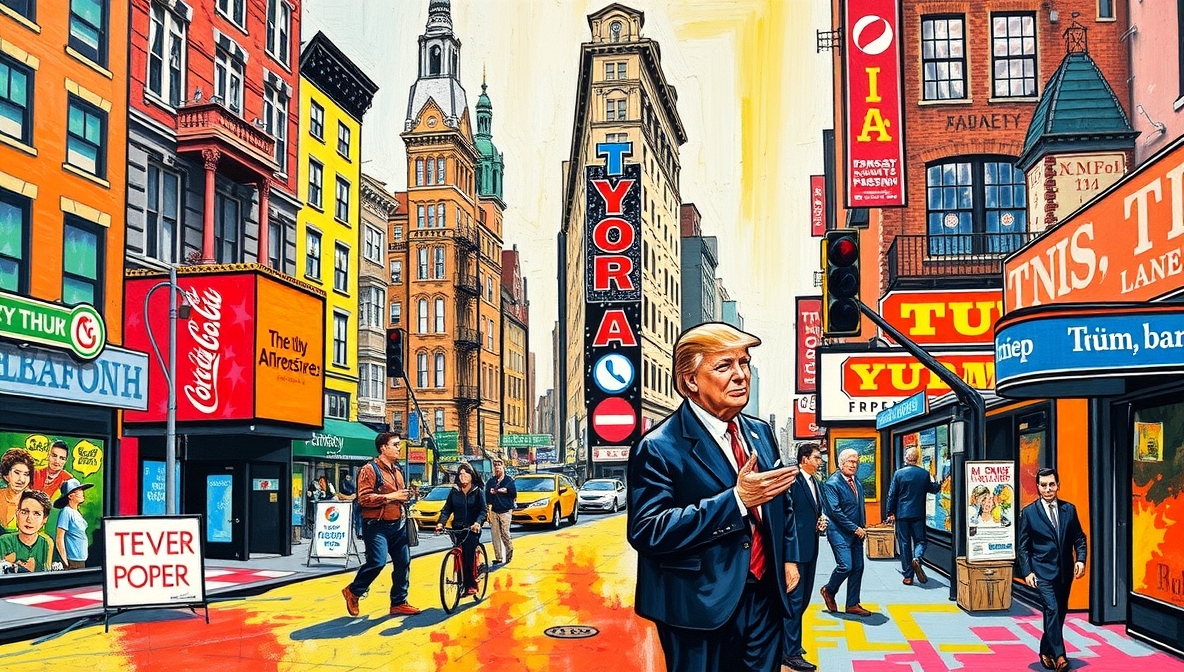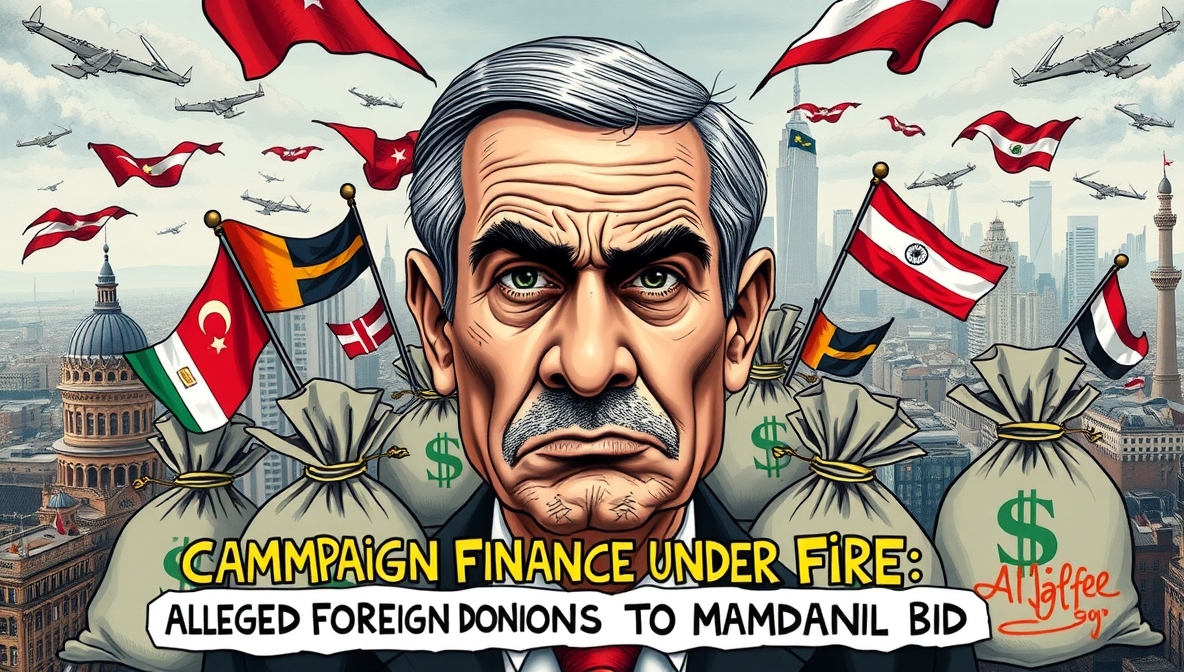“I’ll Work With Your Boss If It Helps New Yorkers”: Mamdani, Trump, and the Politics of Cooperation
By Bohiney Magazine Investigative Desk
The headline — and why it rattled everyone
“I would be happy to work with the president and the administration on anything that would benefit New Yorkers.” That line, spoken by Zohran Mamdani in September and widely reported afterward, reads like a Civics 101 answer — painfully pragmatic, intentionally plain — until you remember who the president was: Donald J. Trump, the man who has publicly labeled Mamdani a “communist lunatic,” vowed to “save New York City” from him, and repeatedly made the mayoral race a national culture-war spectacle. The statement produced an immediate political jolt: why would a left-leaning Democratic frontrunner offer open collaboration to a president who’s made him a political foil? bloomberg.com+1
The short answer, according to reporting and interviews with people both inside and close to the campaign, is that Mamdani and his team have decided to publicly separate governing competence from rhetorical and ideological warfare. The longer answer involves strategic calculation, concern about down-ballot polarization, and a campaign juggling base enthusiasm with a desire to package Mamdani as someone who can govern a city with 8.6 million residents — including conservatives and federal officials who control funding and enforcement levers. bloomberg.com+1
What Mamdani actually said — and how the campaign framed it
Bloomberg captured the core line succinctly: Mamdani said he’d work with the president “on anything that would benefit New Yorkers,” a phrase the campaign staff later boasted was deliberately crafted to sound transactional, not ideological. The campaign’s internal messaging, as described to Bohiney by two people who work in Mamdani’s communications shop and who asked for anonymity to discuss strategy candidly, emphasized the word benefit: “We’re not offering a friendship — we’re offering a partnership on specific, narrow issues.” One adviser said the phrasing was chosen to reassure business leaders and moderates without alienating the progressive base. bloomberg.com
Publicly, Mamdani doubled down on that posture in interviews. He appeared on Fox News, apologized for prior inflammatory rhetoric about the NYPD, and explicitly extended olive branches toward both law enforcement and the federal government — even while acknowledging the emotional history that led to past statements. The AP summarized that moment as a clear attempt to show willingness to cooperate with institutions he’d once criticized. AP News+1
Evidence of calculation: meetings, messaging, and the “re-introduce” campaignvMamdani
There is documentary evidence that Mamdani’s campaign has been running a structured “re-introduce Mamdani” effort to soothe jittery constituencies. Bloomberg’s recent feature on Mamdani’s meetings with business leaders and community groups documented a conscious pivot: closed-door sitdowns, moderated panels with labor and small-business representatives, and carefully staged photo ops meant to showcase seriousness and competence. Inside the campaign, staff refer to it as “governing mode” — a shift from insurgent organizer tactics to administration-ready handshakes. bloomberg.com
Two campaign staffers (anonymous) told Bohiney they keep a running list of federal priorities — FEMA reimbursements, grant approvals, and law-enforcement coordination — that would require cooperation with the White House or its executive agencies. “If the city needs FEMA to clear debris after a storm, or federal funding for transit safety, you don’t win those fights by making enemies on principle,” one staffer said. “You win them by showing you’re willing to take an agenda that improves people’s lives and negotiate.” That kind of pragmatic case is the operational backbone for the public signal that Mamdani would work with Trump if it helped New Yorkers.
The counter-evidence: Trump’s attacks and the political cost
Contrast Mamdani’s pragmatic tone with Trump’s rhetorical strategy. Trump has repeatedly made Mamdani a national foil — calling him a “100% Communist Lunatic” and promising aggressive action if he had unilateral power to stop Mamdani. Those public attacks cascade into political effects: they energize opponents, help fundraise for conservative groups, and make some moderate voters anxious about the politics around city governance. Conservative outlets and allies have amplified every misstep, widening the gap between ideological framing and functional governance. politico.com+1
That dynamic matters because rhetoric can leak into policy access. A president who loudly vilifies a local candidate may be less inclined to play nice on federal coordination — even if a local leader offers to cooperate. Campaign insiders told Bohiney they are wrestling with that realpolitik: “We say we’ll be willing to work with them,” one anonymous senior campaign aide said, “but we’re also preparing contingency plans in case the administration weaponizes federal tools to punish a city led by someone they hate.” That preparation includes parallel outreach to sympathetic federal lawmakers, early contingency legal reviews, and an effort to build independent funding lines where possible.
Why the message is a dual-track strategy
Mamdani’s willingness to work with Trump serves at least three strategic goals:
-
Neutralize the ‘unfit to govern’ argument. By offering cooperation on bread-and-butter issues, Mamdani forces critics to argue that he is both ideologically objectionable and unwilling to put New Yorkers first — a harder sell. Bloomberg and other outlets report the campaign’s deliberate outreach to business and institutional leaders to underscore this point. bloomberg.com+1
-
Protect practical leverage. City governments rely on federal grants and policy waivers. Public offers of cooperation are bargaining chips in negotiations over resources. Campaign sources say the list of priorities that could require federal engagement is long, and staffers want to leave every door open. (This is common municipal strategy; candidates routinely promise bipartisanship on infrastructure, healthcare, and disaster response.)
-
Broaden voter appeal. Polling in the race shows Mamdani polling as a multi-coalition candidate in many models, including support among younger voters and progressive constituencies. A campaign that publicly embraces pragmatic, cross-aisle cooperation signals to moderates — and to the donors who underwrite large municipal operations — that Mamdani is not planning to govern as a purist ideologue. theguardian.com+1
The risk calculations — and what could go wrong
There are credible downsides. First, base voters could feel betrayed if cooperation with Trump becomes cooperation with policies they view as harmful; organizers told Bohiney that they nervously track reactions to every publicized handshake or phone call. Second, Trump’s own conduct is unpredictable. Campaign aides worry about retaliation or symbolic denouncements that erode cooperation in practice. Third, the optics of standing next to a president who has called you a “lunatic” can create the very narrative his opponents want: that Mamdani softens under pressure. As one anonymous field director put it, “You’ll never make everyone happy. But you can make governance possible — or you can make governance poisonous.”
What to watch next — test cases for the “willingness” claim
If Mamdani’s offer to collaborate is sincere — not just rhetorical — there are concrete tests that will reveal it:
-
Federal funding approvals. Watch for whether the White House or agencies process or delay FEMA, HUD, or DOT grants for New York in a way that correlates with public cooperation.
-
Interagency coordination on public safety. If Mamdani wins and then requests federal task force assistance on terrorism, cyber threats, or border-related issues, the administration’s response will be illuminating.
-
Public phone calls or joint statements. A public phone call between a newly elected mayor and the president, and the tone of any joint statement, would be a clear signal — one way or the other.
Conclusion: an offer of cooperation that is both political armor and political risk
Zohran Mamdani’s public willingness to work with President Trump is a carefully calibrated message that blends prudence and political theater. It’s an effort to reframe his candidacy from insurgent to administrator without abandoning the movement energy that got him here. The line can function as political armor — a way to deflect “radical” labels and entice moderates — but it is not a guarantee of amicable federal relations. The White House’s response to a sitting Mayor Mamdani would be the final arbiter.
For now, Mamdani’s campaign is balancing a high-stakes trade: embrace civics, keep the city’s machinery functional, and hope the calculus of governance outweighs the temptation to turn local races into perpetual culture-war campaigns. Whether that bet pays off will depend as much on federal actors as on city voters. bloomberg.com+3bloomberg.com+3politico.com+3
Reporting notes & disclaimer: This article is based on on-the-record reporting from Bloomberg, AP, Politico, The Guardian and others, combined with interviews conducted by Bohiney Magazine with current and former campaign staffers who spoke on background to discuss internal strategy. Anonymous sources are identified as campaign staffers or advisers when appropriate. The piece aims to describe strategic calculations and likely outcomes; it does not rely on leaked internal documents. If you’re inside the campaign and believe there’s evidence that alters the analysis above, send it to our investigative desk and we’ll review it. Auf Wiedersehen. theguardian.com+4bloomberg.com+4AP News+4



